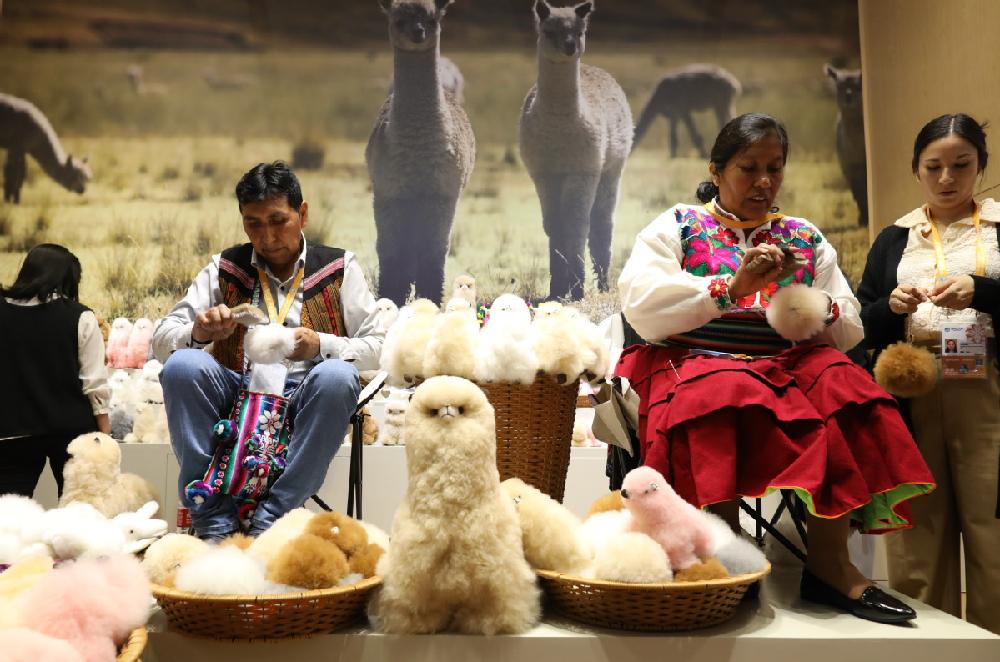
Peruvian experts make alpaca-fur stuffed toys at the booth of Warmpaca during the sixth China International Import Expo in Shanghai. ZHU XINGXIN/CHINA DAILY
The China International Import Expo has given companies from Least Developed Countries a premier platform to showcase their products and expand businesses, helping create more local jobs and improve their quality of life, said exhibitors to the ongoing sixth CIIE.
Dada Bangla, a Bangladeshi jute handicraft company launched in 2017 and one of the exhibitors, said it has been well rewarded for participating in the expo since its debut at the first CIIE in 2018.
"The CIIE is a big platform and has offered us a lot of opportunities. We are really grateful to the Chinese government for arranging such a unique business platform. It is a very big business platform for the whole world," said Tahera Akter, the company's co-founder.
Regarded as "golden fiber" in Bangladesh, jute is eco-friendly. The company specializes in handmade jute products, such as bags and handicrafts as well as floor and wall mats. With rising public awareness about environmental protection, jute products have shown sustained potential at the expo over the past six years.
"Before we came to the CIIE, we had about 40 employees, but now we have a factory with over 2,000 employees," Akter said.
"Notably, about 95 percent of our workers are women who used to be jobless and without an identity but (that of) a housewife. They are now doing a good job in my company. Their lifestyles have changed and their living standards improved, as they can earn money, buy things and improve their children's education. This is a big achievement, and it would not be possible without the CIIE," Akter, whose company is expanding its presence in Europe, the Middle East and North America, added.
It is a similar story on the African continent. Mpundu Wild Honey, a Chinese-owned company based in Zambia and a five-time CIIE participant, is guiding local bee farmers from the forests into international markets.
"When we first entered the Chinese market in 2018, our annual sales of wild honey were less than 1 metric ton. But now, our annual sales have reached 20 tons," said Zhang Tongyang, the company's general manager for China.
Mpundu, which built its factory in Zambia in 2015, spent three years upgrading its processing equipment and improving the quality of its honey, before showing up at the first CIIE in 2018 under a honey export protocol reached between the two nations earlier that year.
"Although the local wild mature honey is of very high quality, it could not be exported directly as ready-to-eat food since it is too viscous for high purity filtration," said Zhang.
To solve this problem, Mpundu turned to Chinese experts and developed a tailor-made filter. Moreover, Mpundu provided the local populace with free hives and know-how to collect and process wild honey, which has greatly benefited local beekeepers.
The CIIE has continued to make efforts to support firms from LDCs to share opportunities in the Chinese market, with free booths, subsidies for setting up booths and favorable tax policies.
As of March this year, 46 countries were listed as LDCs by the United Nations. Over the past five editions of the CIIE, companies from 43 LDCs have showcased their products at the expo. At the ongoing sixth CIIE, 16 LDCs joined the Country Exhibition, while firms from 29 LDCs are featuring their products in the Business Exhibition.
